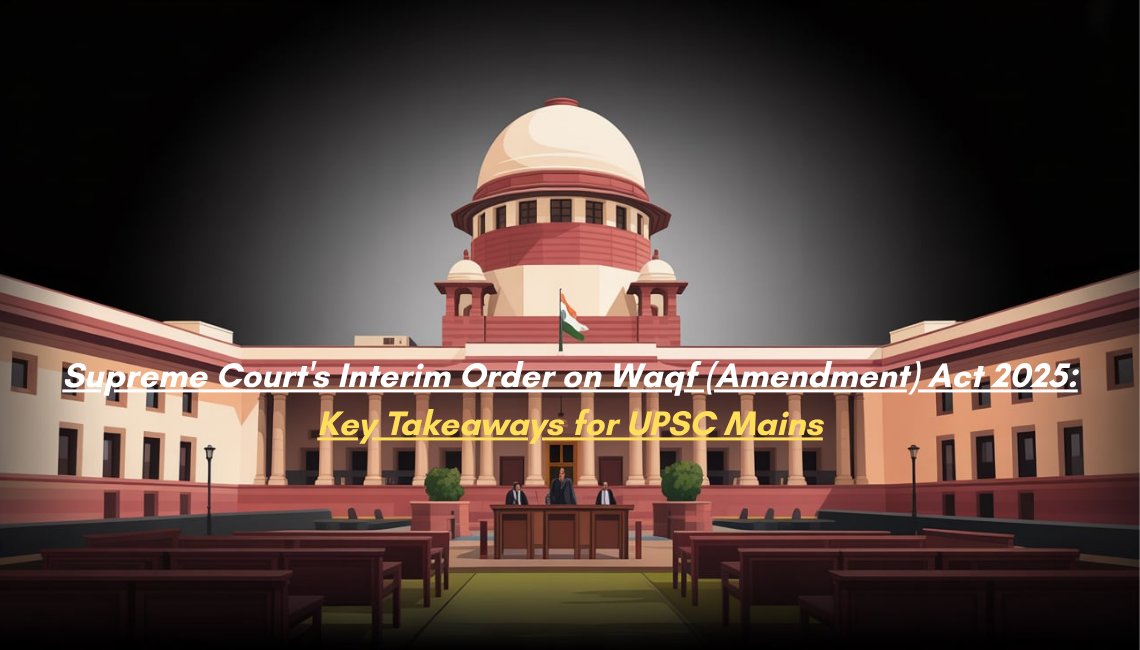The Supreme Court's temporary decision regarding the Waqf (Amendment) Act 2025 has become a topic of discussion. For UPSC candidates attempting to understand its nuances - not simply legal ones but more fundamental issues such as secularism, governance rights of minorities and constitutional principles is important.
1. Understanding the Waqf (Amendment) Act 2025
The Waqf (Amendment) Act 2025 was made to organise the management of Waqf properties and prevent property encroachment or mismanagement. These properties, often used for religious and social activities for members of Muslim faith communities, had historically experienced corruption and neglect - this new legislation sought to increase accountability and oversight by streamlining management procedures and providing more oversight mechanisms.
The emotional angle: For many, the Waqf properties go beyond properties or buildings, but are symbolic of trust in the community and heritage as well as social wellbeing. Any law change can affect the lives of people and their way of life.
2. Supreme Court's Interim Stay
The apex court, in response to petitions that challenge specific aspects of the Act, has issued an indefinite stay. The controversial provisions of the amendment won't become effective until the court has issued an ultimate verdict.
The takeaway for UPSC: This emphasizes the role of the judiciary as guardian of constitutional rights, and balancing legislative intent and protecting of minorities' rights and the right to due procedure.
3. Key Legal Issues in Question
The most important concerns are:
-
Limitations on Waqf boards autonomy could impact the management of educational institutions, mosques as well as community assets.
-
Uncertainty over penalties for encroachment or mismanagement.
-
Emotional angle: For many communities, these properties are lifelines--supporting schools, orphanages, and healthcare facilities. Recent legal changes could cause worry and uncertainty.
4. Implications for Governance and Policy
-
Lawmakers need to ensure stakeholder engagement particularly with minority communities.
-
Legal safeguards, checking and balances is vital to stop exclusion.
-
Transparency in management of assets for the public is not at the expense of trust in the community.
-
UPSC Perspective: Aspirants need to realize that lawmaking isn't solely procedural but deeply personal that affects our lives.
5. Constitutional Angles
The case raises important issues for UPSC candidates to keep in mind:
-
The Article 25 (Freedom of Religion): Does the amendment violate religious rights?
-
The Article 14 (Equality before Law): Does Waqf board members being treated differently than the other trusts in community?
-
Article 21 (Right to Life): Can uncertainty in management affect the lives of those who depend of Waqf?
6. Social and Economic Impact
Waqf properties have a major impact on health, education and social well-being in India. The interim stay will ensure:
-
Projects in progress aren't suddenly interrupted.
-
Communities that depend on these services continue to function with no fear.
-
The policymakers are reminded to keep reform in check while retaining compassion.
-
Emotional perspective for women, students and groups that are marginalized from Waqf-run clinics or schools is that the Waqf order provides the feeling of safety and hope.
7. Lessons for UPSC Mains Answer Writing
-
Understand the context: Always clarify the reasons why Waqf properties are important economically, socially as well as culturally.
-
The link with Constitutional Values: Discuss the secularism of minorities, rights for minorities, and due process.
-
Balanced Analysis: Identify government intention and oversight by the judiciary and show both sides.
-
Human Element: Consider the way policies impact real people, not only laws written on paper.
-
Pro Tip: Begin with a an introduction that is brief, then use bullet points to help you make your point and then conclude with a well-balanced opinion that is that is based on the law, governance and social implications.
8. Way Forward
The final decision of the Supreme Court will clarify the extent and limitations of the amendment 2025. The legislature may have to amend the law to address concerns of a judge.
Conclusion
The court's interlocutory ruling on the Waqf Amendment Act 2025 serves not only as legal precedent, but is an indicator of where minority rights, reform and morality in our Constitution may lie. Aspiring UPSC candidates can use it as an in-depth study on law, governance and social awareness.
When writing your answers, concentrate upon clarity, constitutional links with human impacts, as well as an unbiased analysis. Remember that UPSC prefers candidates who can connect legal developments to the real world while showing compassion and a critical mind.







